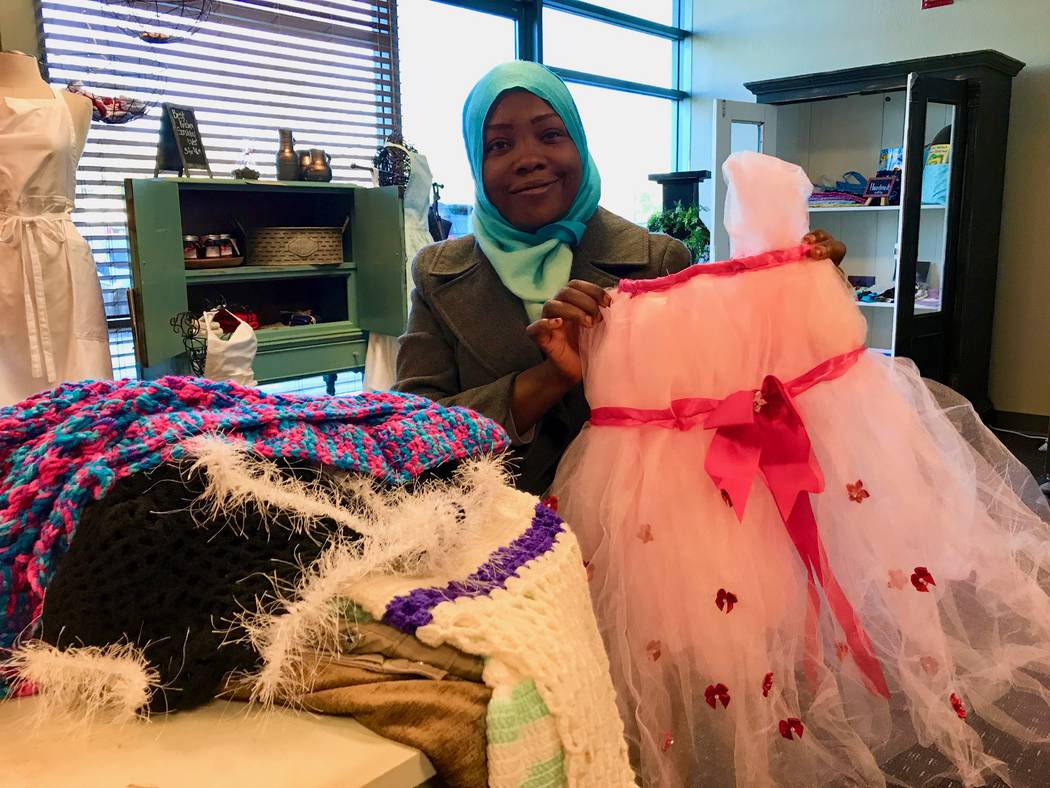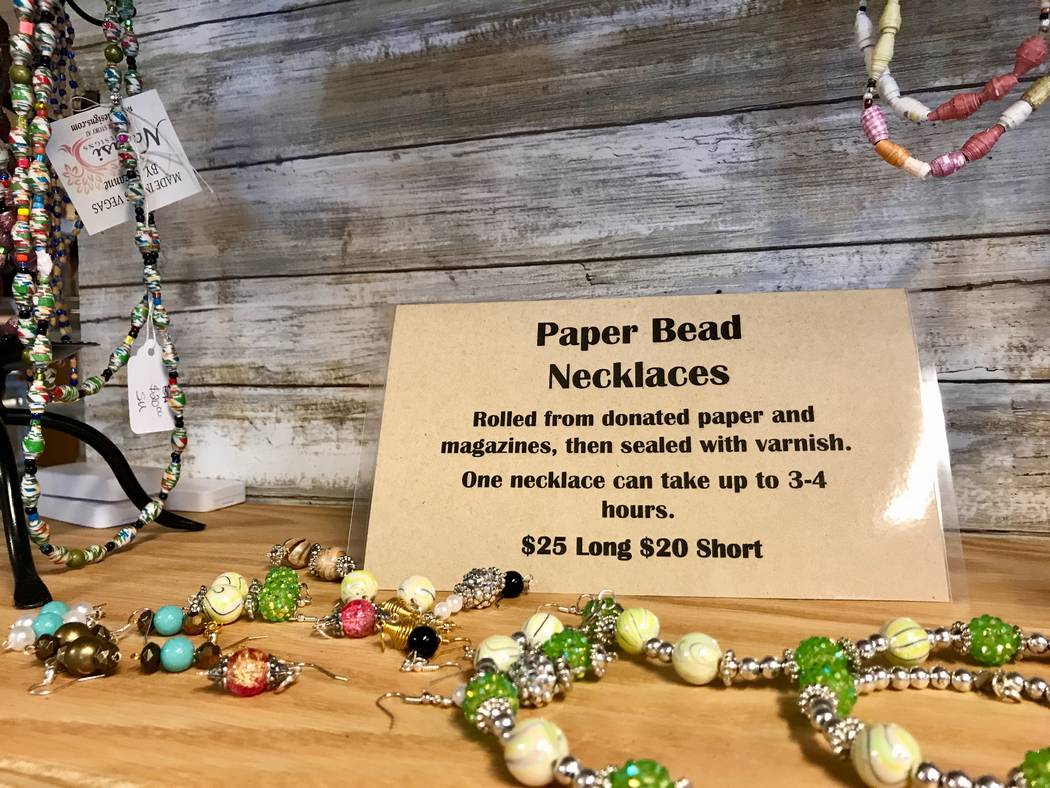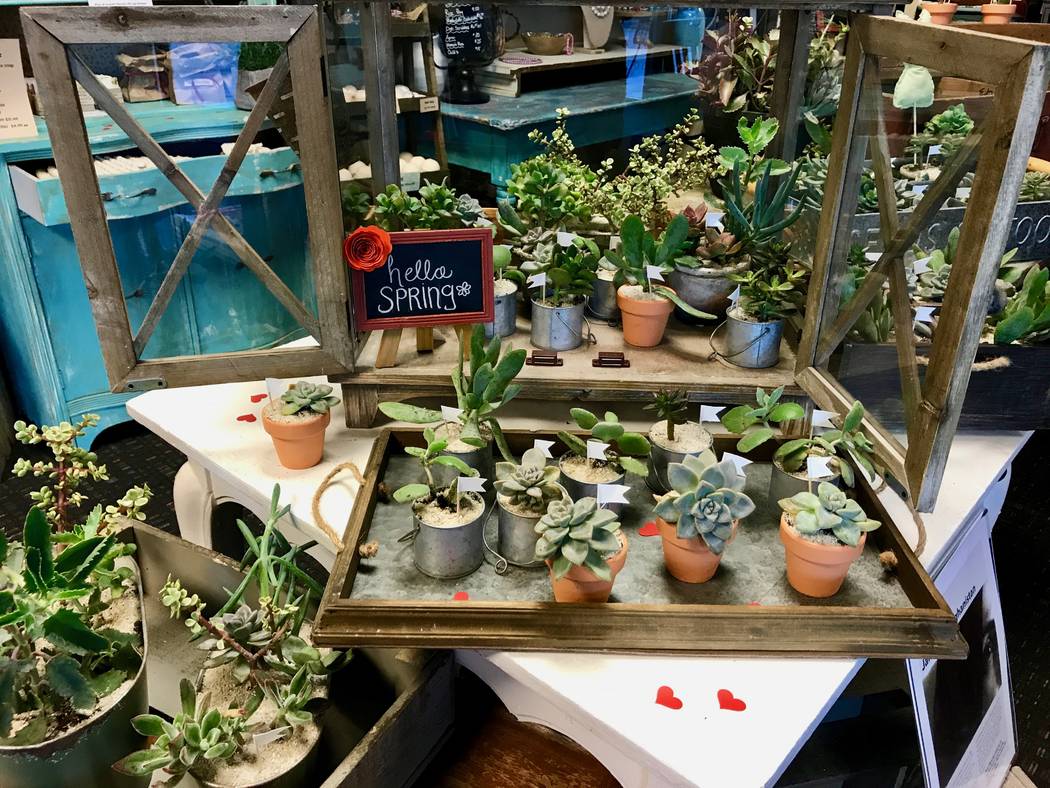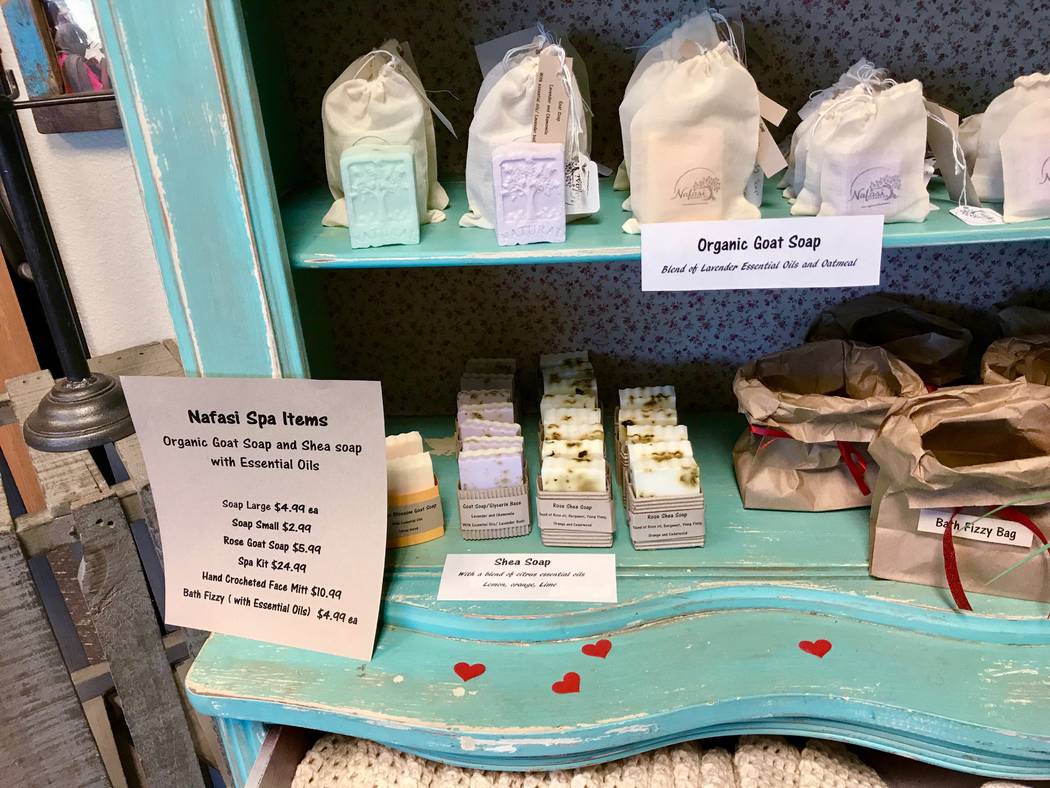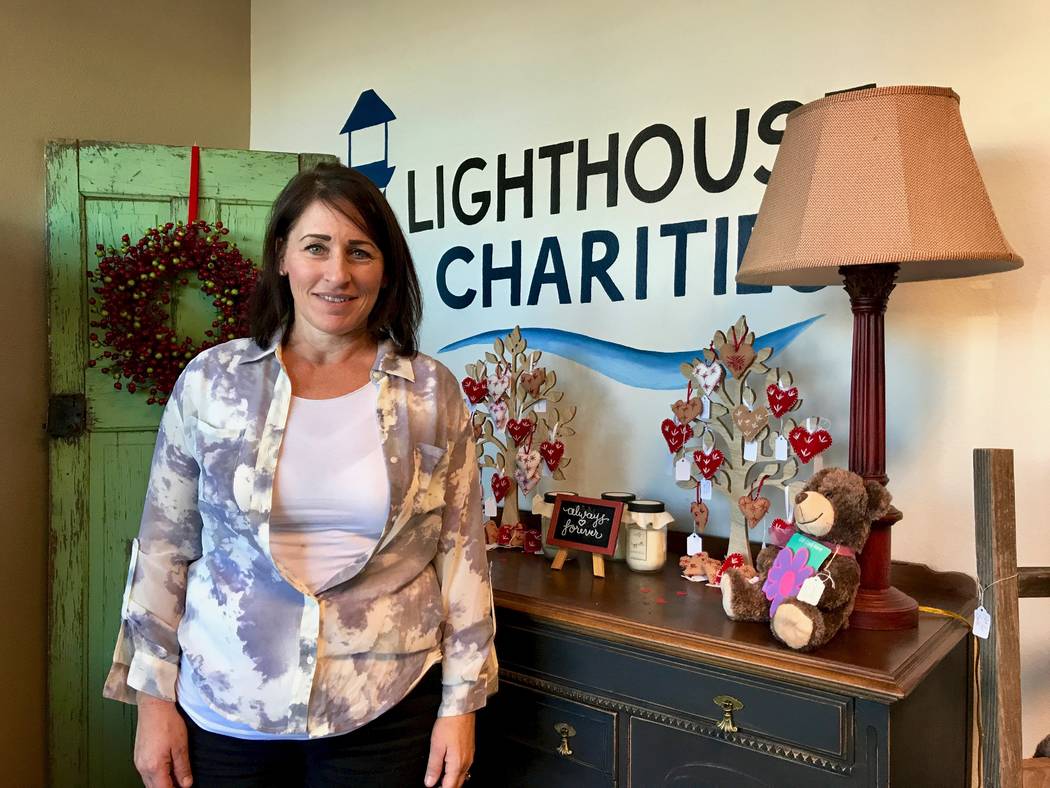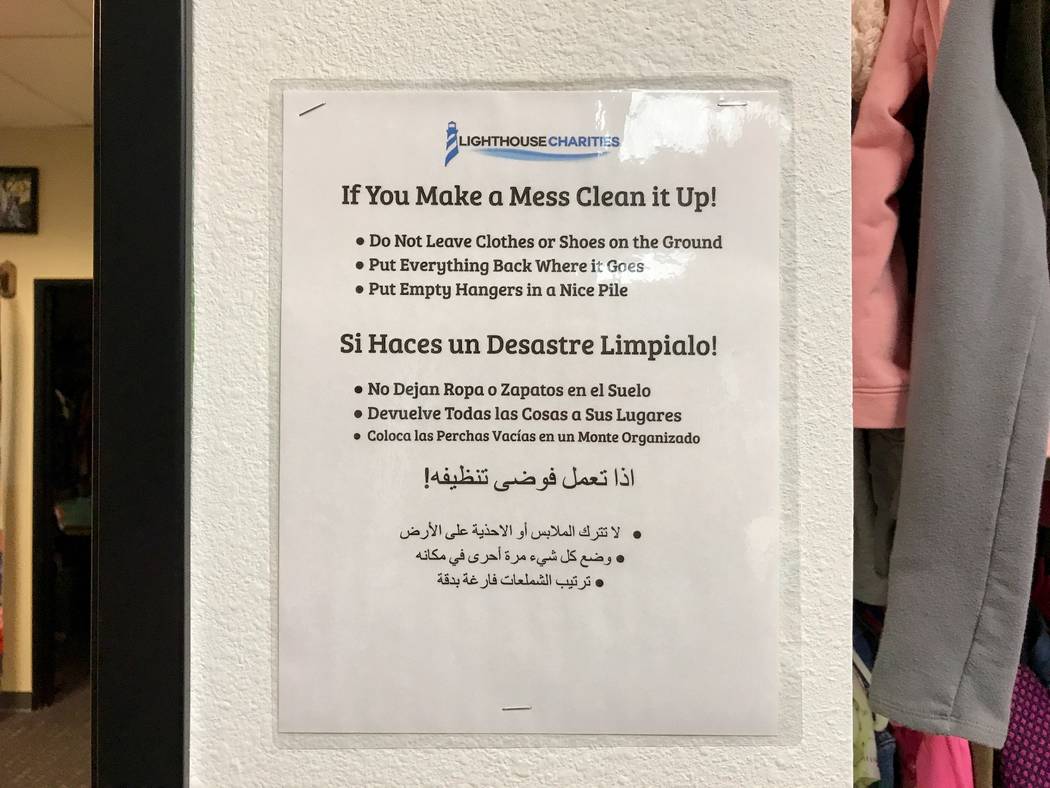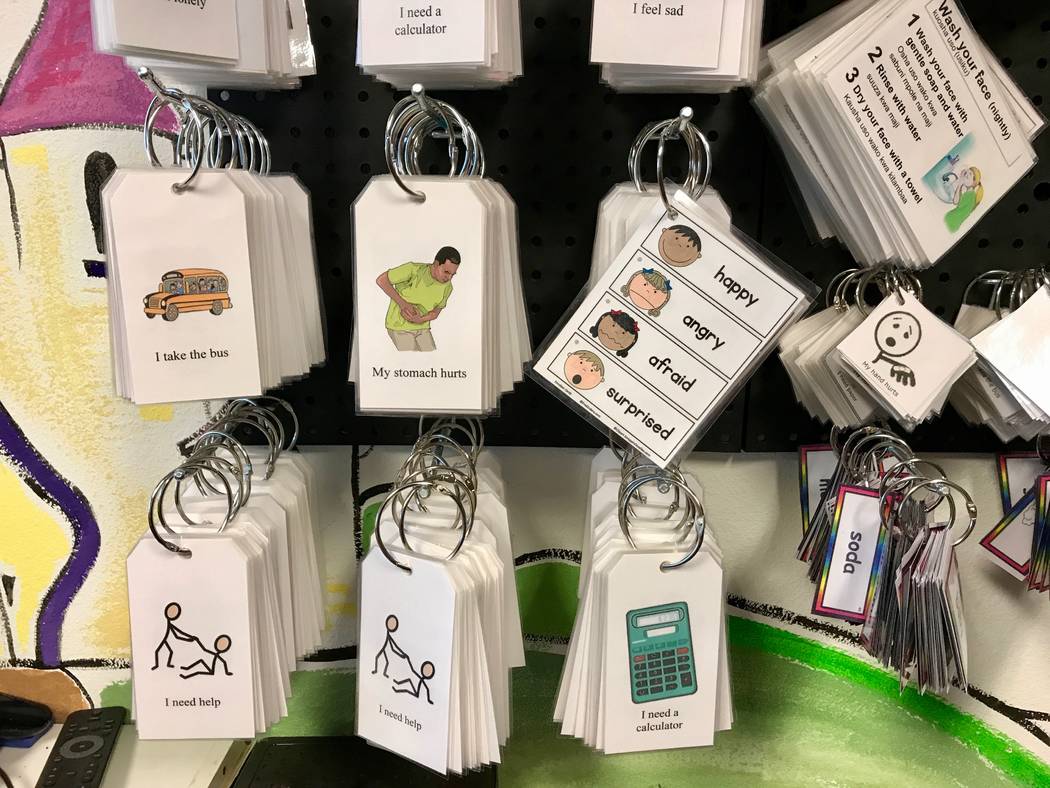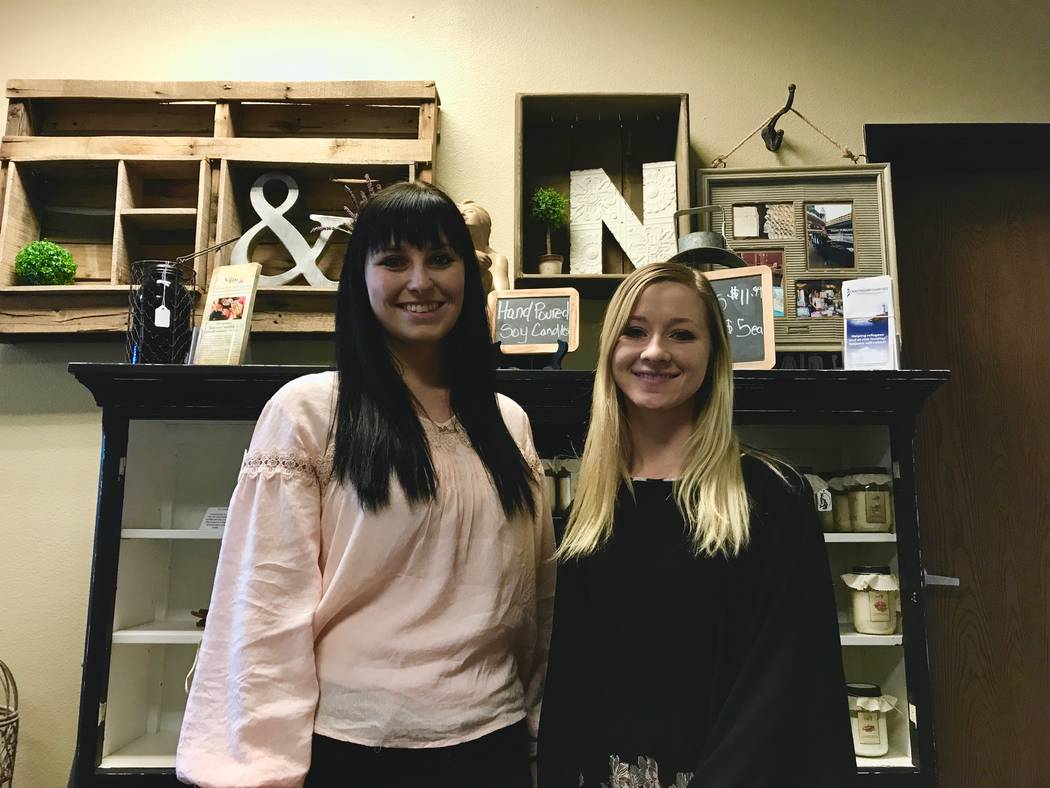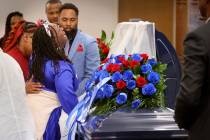Lighthouse Charities helps resettled refugees in Las Vegas
Ragaa Omer, 32, sits in the lobby at Lighthouse Charities on a clear but chilly Wednesday morning in North Las Vegas. Colorful paper bead necklaces hang from the walls, handknit and stiched dresses are displayed on racks and small succulents in clay pots decorate shelves and tables.
Omer is wrapped a gray coat, and a blue scarf covers her head. Tears are in her eyes.
She’s recounting her struggles as a Sudanese refugee since her resettlement to the U.S. in 2013. It still doesn’t feel like home.
She’s at Lighthouse, a nonprofit established in 2014, to try and find work. Omer has a medical condition that gives her migraines; she’s sensitive to light and sound, which precludes her from getting many jobs, she says. She has two children, ages 2 and 4, whom she cares for at home while her husband works.
“I’m looking for anything to help me,” Omer says.
The mission
Lighthouse Charities aids refugee and at-risk families become self-reliant through English classes and job training and by providing clothing and furniture for newly resettled families. Lighthouse partners with both of the Las Vegas Valley’s resettlement agencies, Catholic Charities of Southern Nevada and the Ethiopian Community Development Council.
In 2016, over 3,000 refugees settled in Nevada, according to Catholic Charities. About 70 percent of those were from Cuba; others came from the Democratic Republic of the Congo, Iran, Eritrea and Iraq.
Before refugees arrive in Las Vegas, their case will have been assigned to one of the two agencies. Each family or individual will have a caseworker who helps them find an apartment, enroll in English classes and look for a job.
But first they need clothing, furniture and hygiene products. The children, who must be enrolled in school within 30 days of arrival, need backpacks, notebooks and supplies.
Every resettled refugee is referred to Lighthouse, where they’ll receive a week’s worth of clothing and other basics.
They’ll also come back for English classes, held Mondays through Thursdays, for job training and to consign handmade items for extra (or sometimes their only) income.
Struggles of resettlement
At home in Sudan, Omer had the equivalent of a master’s degree in accounting and worked in a bank.
Omer wanted to go to school while in Las Vegas to get a degree, she said, but she couldn’t understand the financial aid forms she was given and didn’t fill them out. She can’t afford to pay the college tuition on her own.
She also wants to send money home to her mother and brother, who were involved in separate car crashes.
“My brother needs another surgery for his feet,” Omer said. She pulled out a phone and flipped through several photographs of her brother and his foot, which was broken in several places and had not healed properly.
“Today I came to Cindy to help me.”
She was referring to Cindy Trussel, founder and president of Lighthouse Charities. When she started the charity four years ago, she began with a food-rescue program. She drove her van to retail stores across the valley, recovering food and other products that could not be sold.
Then, she went to apartment complexes that she knew had low-income families to distribute the goods.
Within eight months she discovered the refugee population. She saw a social media post from a Snyder Elementary School counselor asking for help collecting food for low-income and refugee students for Thanksgiving.
“Immediately I felt like I should call her,” Trussel said. “She told me about the refugee population and that some of the families in her school were so needy. I asked her: If you needed anything, what would that be?”
A full food pantry, the counselor answered.
In two weeks, Trussel had collected 2,000 canned goods and bags of clothing, coats and shoes from neighbors, friends and members of her church.
Soon, she was feeding 3,000 people and storing all of the supplies in her home. The number grew to 5,000.
Trussel said her empathy comes from a place of understanding. In 1980, when she was 11, Trussel immigrated to California from Australia. The country was going through a drought and despite his effort, her father lost his job and couldn’t find work.
“We were about to lose everything, our home, everything,” Trussel said. “So my parents decided we would take the risk and sell everything we had and pack up a suitcase.”
Trussel had five siblings, and each had to share suitcases. It took six months for her father to find a job, she said. She and her siblings slept on a floor for months and had little money to buy school supplies. They went through that difficult time, she said, with the advantage of knowing English.
“(Refugees) are expected to find employment and learn a language and acclimate in a very short amount of time, and it is impossible to do that,” Trussel said. “I could not learn a language in that time.”
Growing need
When her food-rescue operation grew too large for her home, a friend gave Trussel money to rent an extra house for storage. And after a lot of time and effort, Trussel said, she secured a business space at 3435 W. Cheyenne Ave., where Lighthouse operates today.
Inside, it looks like a consignment store. A table in the center of the room is decorated with potted succulents. On a wall hang hundreds of paper bead necklaces. Hand-sewn dog leashes, bow ties and rice bags sit on a shelf. Bath soaps and candles in scents like lavender, rose and orange blossom perfume the room.
Really, it is a consignment shop. There’s just one difference: Everything is made by refugees.
Trussel launched this program, Nafasi Designs, in June (Nafasi is Swahili for opportunity/favorable circumstance). She began by holding craft-training programs and selling necklaces. Now, 55 women are consigning with Nafasi.
“I just met (Ragaa Omer) a month ago. She’s a perfect example of why we’re doing Nafasi,” Trussel said. “She has talent. She has skills. They may not be useful to someone like Walmart or Target where she can get employment, but she has skills.”
Omer has been baking and sewing to consign with Nafasi while she works on her English and tries to find a job. That day, Omer arranged dozens of shortbread cookies and several children’s dresses she had made on a table.
Trussel said the nonprofit has been shifting its focus to job training in recent months.
“I need to teach these people how to fish. You know, that old proverb,” she said. “I can give them food today, but they’re going to need it again tomorrow.”
Trussel signed a lease on a 4,000-square-foot space behind Lighthouse’s offices to create a job-training space. Through partnerships with hotel companies and grocery stores, clients will receive training and be able to attend English classes and resume workshops.
Trussel hopes to add a computer lab so clients can look for jobs, as well as a woodshop and full-service kitchen so they can learn woodworking and cooking skills.
Refugees receive about $1,100 in government funds each when they’re resettled. That money is expected to go toward rent, food and furniture while they acclimate and find work.
“That money runs out within a few months,” Trussel said. “Many of them come here lacking even references, because who can they even list that’s viable to an employer here? … They don’t have any employment background or resumes to put on their applications, so they struggle and don’t get the jobs they deserve.”
A core part of Lighthouse, the Grant a Wish program, connects volunteer families with refugee families for mentoring in life skills and to address needs.
Things that seem simple to us, Trussel said — like opening a can or using a squirt bottle — are foreign concepts for people who have lived their lives in refugee camps.
A list of families and their needed items are on the Lighthouse website, as are stories of successful mentorships.
“What happens sometimes with other organizations is people donate but they don’t see where it goes,” Trussel said. “This changes that. This gets people connected with what they’re doing and why they’re doing it.”
An essential part of resettlement, she said, is having a voice.
“I want … to give them an opportunity to share their hardships and other things they have struggled with,” Trussel said, “so others will support them and help them with employment and other opportunities they deserve.”
Contact Madelyn Reese at mreese@viewnews.com or 702-383-0497. Follow @MadelynGReese on Twitter.
Lighthouse Charities
What: A nonprofit that helps refugees and at-risk families by providing clothing, hyiene products, household items, school supplies, English classes, cultural mentoring and employment assistance.
Where: 3435 W. Cheyenne Ave., No. 103
Phone: 775-382-2911
Website: lighthousecharities.net
Social media: facebook.com/LighthouseCharitiesInc



